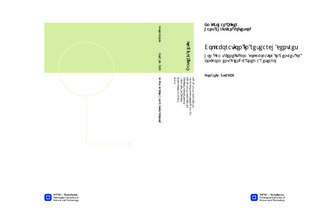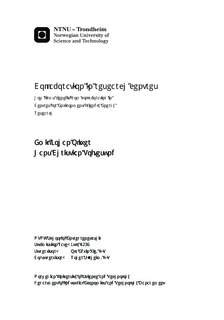| dc.contributor.advisor | Vie, Ola Edvin | nb_NO |
| dc.contributor.advisor | Sørheim, Roger | nb_NO |
| dc.contributor.author | Toftesund, Hans Christian | nb_NO |
| dc.contributor.author | Oliver, Emil Johan | nb_NO |
| dc.date.accessioned | 2014-12-19T14:30:57Z | |
| dc.date.available | 2014-12-19T14:30:57Z | |
| dc.date.created | 2014-09-05 | nb_NO |
| dc.date.issued | 2014 | nb_NO |
| dc.identifier | 744100 | nb_NO |
| dc.identifier | ntnudaim:11784 | nb_NO |
| dc.identifier.uri | http://hdl.handle.net/11250/266821 | |
| dc.description.abstract | This thesis aims answer how knowledge intensive firms benefit from collaborating in research centres, which is based on our desire to study Norwegian Centres for Environmentally Friendly Energy Research (CEER) where several research institutions and firms are involved. The study is applies the field of knowledge management, and the most central theories covered in this thesis are related to knowledge management, knowledge integration, proximity and information and communication technologies (ICTs). We have employed a qualitative research strategy and designed a single-case study of the CEER Solar United. A total of 20 interviews were conducted, where the interviewees were representatives from 12 current and previous industry partners, in addition to 4 out of 5 research partners in Solar United, using thematic analysis. Our theoretical foundation is framework which was based on a literature review conducted in the fall of 2013. From this theoretical framework, we created four sub-research questions that have been applied in the discussion in order to answer our main research question. We presented empirical data for further discussion, explaining how Solar United operates as an organization as well as challenges in having partners which are geographically spread.The insight we gained through answering our sub-research questions were used to answer the main research question. Our conclusions are that large firms with funds for R&D have the research partners develop firm-specific competence which is later applied in binary research projects. Smaller firms with lower R&D capacity conduct research that advances their technological development within the research centre. Supporting industry partners primarily benefit by gaining insight into the state-of-the-art as well as customer insight. Thus, all industry partners benefit from different kinds of knowledge creation.These findings are constituted in a model which we suggest should be validated through further research on other research centres. The thesis is ended by pointing out theoretical and practical implications, as well as proposals for further research. | nb_NO |
| dc.language | eng | nb_NO |
| dc.publisher | Institutt for industriell økonomi og teknologiledelse | nb_NO |
| dc.title | Collaboration in research centres: How firms benefit from collaborating in Centres for Environment-friendly Energy Research | nb_NO |
| dc.type | Master thesis | nb_NO |
| dc.source.pagenumber | 129 | nb_NO |
| dc.contributor.department | Norges teknisk-naturvitenskapelige universitet, Fakultet for samfunnsvitenskap og teknologiledelse, Institutt for industriell økonomi og teknologiledelse | nb_NO |

